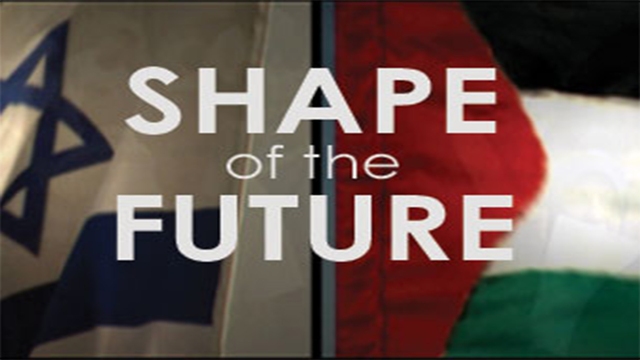Shape of the Future
When thinking about a Palestinian-Israeli peace settlement, the emphasis is on the future, not the violent past.
 In an unprecedented simultaneous broadcast across the Middle East, four channels including Israeli TV will air a series examining how the key Israeli-Palestinian issues might be resolved. 'Shape of the Future' portrays on a very human level what an eventual Palestinian-Israeli peace settlement might look like.
In an unprecedented simultaneous broadcast across the Middle East, four channels including Israeli TV will air a series examining how the key Israeli-Palestinian issues might be resolved. 'Shape of the Future' portrays on a very human level what an eventual Palestinian-Israeli peace settlement might look like.
"We cannot spin the wheel of history backwards," states Israeli Minister Tsipi Livni. "Therefore we must build a new future." After over forty years of violence, there is a growing realisation on both sides that painful compromises must be accepted for the sake of peace. This programme explores the background, various positions and options for settlement in four of the main disputed final status issues: the Settlements, Jerusalem, Right of Return and Security.
"Jerusalem for me is the most important city in the world," proclaims Israeli Uri Amedi. Palestinian Nazmi Al-Jubeh agrees: "Jerusalem is part of every Palestinian's soul. It's the spiritual, material, commercial and cultural centre for all Palestinians." Both consider the city essential to their national existence. Both insist it must be their capital. But if neither side will compromise their claim, both accept the other's right to also live there. "Jerusalem could be the capital of two states - an open and joint city," suggests Palestinian advisor Nazmi Al-Jabeh.
But sharing a capital will be impossible unless Israelis feel they can co-exist securely with Palestinians. "When my son goes to school, I worry he will come back home," confides Riki Amedi. To Israelis like her, security checkpoints and military incursions are a necessary evil protecting them from suicide bombers. To Palestinians, they're a constant source of oppression. But there is a way to break this cycle of hatred. "The real solution lies in reaching an awareness in which both sides become partners in mutual security," states Palestinian security expert Zuhair Manasra. Former Shin Bet director Yacov Perry agrees: "There has to be a peace process where both sides see a chance for an end to the conflict." Peace is, by definition, security.
And for lasting peace to be achieved, the issue of Israeli settlements will need to be addressed. "There will be no escape from removing settlements in certain areas," admits Ze'ev Schiff. But to many, any talk of dismantling the settlements is abhorrent. So under what circumstances could settlers be persuaded to leave? Zohar Sadeh used to live in the Israeli settlement of Sinai. She was evacuated after her government made peace with Egypt. "It was very difficult," she recalls. However, now "my wounds have healed. There is life after evacuation." An option is the idea of a land swap, exchanging land of equal size and value for land that the larger settlements are on.
One of the most contentious issues hampering peace is the Right to Return. But even Palestinian Minister Hisham Abdel Razeq accepts, "The return of thousands or millions of refugees to Israel will not be a solution." And how many Palestinians would actually want to live in Israel? Respected pollster, Dr Khalik Shikaki, questioned 4,500 refugees on where they would like to live. Only 10% wanted to live in Israel. The vast majority wanted to live in a Palestinian state.
Reaching agreement on these issues involves numerous painful sacrifices. However, there's a growing realisation that there is no other option. After all, in the words of Yacov Perry "Even the most extreme Israeli leaders understands that establishment of an independent Palestinian state is the only solution."
Common Ground Productions
FULL SYNOPSIS
